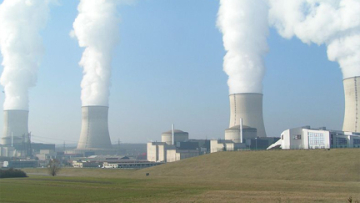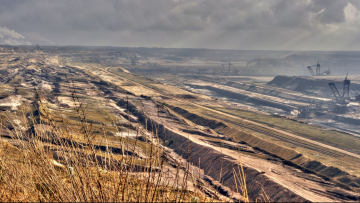Fear of change could precipitate demise of Europe’s energy giants
Further information and interviews
Gyorgy Dallos - Greenpeace International Senior Advisor, author of the report: +31 6 55 12 54 82, gyorgy.dallos@greenpeace.org
Franziska Achterberg - Greenpeace EU energy & transport policy director: +32 (0)498 362403, franziska.achterberg@greenpeace.org
Greenpeace EU pressdesk: +32 (0)2 274 1911, pressdesk.eu@greenpeace.org
Further information and interviews
Gyorgy Dallos - Greenpeace International Senior Advisor, author of the report: +31 6 55 12 54 82, gyorgy.dallos@greenpeace.org
Franziska Achterberg - Greenpeace EU energy & transport policy director: +32 (0)498 362403, franziska.achterberg@greenpeace.org
Greenpeace EU pressdesk: +32 (0)2 274 1911, pressdesk.eu@greenpeace.org
Europe's largest power companies are in trouble because of their reluctance to question dated business models in the face of far-reaching structural changes to Europe's energy market, according to a new report released today [1].
Gyorgy Dallos, Greenpeace International Senior Advisor, the author of the report: "There is no question that today the EU utility sector is facing a paradigm shift which is stretching the energy giants' antiquated business models to breaking point. The largest utilities not only thought they could sail through the current turbulence by the usual lobbying and cost-cutting; they even actively contributed to their financial troubles. They expanded their capital expenditures after the 2007 financial crisis and built up large gas-coal overcapacities in a shrinking market, while letting control over renewables slip to others. These mistakes seriously throw into questions the power giants' ability to keep afloat in this fast-evolving energy market."
The report reveals the extent to which the EU's energy giants are weighed down by over-investments in gas and coal plants, while continuing to overlook lucrative opportunities in an expanding renewables sector. It shows how companies have made a poor show so far of adapting to new market realities - losing half a trillion euros in five years [2] - and builds the case for a fundamental shift in how they run their businesses.
Greenpeace EU energy & transport policy director Franziska Achterberg said: "Europe's energy companies are wounded animals with bleeding profits and a gloomy outlook. So far, their response has been to vent their rage at renewables and lobby aggressively against any policies that help secure an energy transformation. But failure to adapt will only make it harder to defend their alpha-male status in an increasingly challenging environment that could spell their downfall."
The Greenpeace report exposes for the first time that while the EU's top ten energy companies generate over half of all power within Europe (58 per cent), only four per cent of this is from renewable sources (excluding hydro power). Despite slowing demand, energy companies have added 85 gigawatts (GW) in fossil fuel power capacity in the last ten years - the equivalent of all of Germany's fossil fuel power plants. Analysts suggest that they need to shut down about 50 GW of fossil fuel capacity by 2017 if they want to maintain even their diminished 2012 profit levels [3].
Having missed the train of the renewables revolution, energy companies are now trying to derail it by putting pressure on EU governments to turn back. In the crucial debate on EU climate and energy policy for 2030 taking place right now, power utilities oppose targets to increase the share of renewables and reduce energy consumption.
Power utilities attack renewable energy policies even though some companies, like Iberdrola, E.ON and Enel are estimated to have made a total of €4-5 billion in annual earnings from their renewables businesses [4]. J.P. Morgan puts a much higher value on E.ON's renewables business than its conventional generation business [5].
Large power companies have no alternative but to redesign their strategies. European governments - often themselves major shareholders of these companies - have the responsibility to shepherd them towards new economically and environmentally sustainable business models. They should agree three binding 2030 targets for the EU to increase the share of renewables to 45 per cent, cut carbon emissions by at least 55 per cent and improve efficiency by 40 per cent.
Briefing: Locked in the past - New report explores why Europe's big energy companies fear change.
Notes:
[2] The Economist, 12 October 2013, European utilities: How to lose half a trillion Euros - Europe's electricity providers face en existential threat.
[3] Bloomberg, 7 March 2013, Utilities need to close 30% of European power plants, UBS says.
[4] Iberdrola, 23 October 2012, Outlook 2012-14; E.ON, 13 March 2013, Full year 2012 results; Bloomberg Professional, Enel IM Equity, FA - financial analysis, Segments, December 2013.
[5] J.P. Morgan, 19 November 2013, German Utilities: RWE: balance sheet story continuing to unfold, maintain preference vs. EON.




